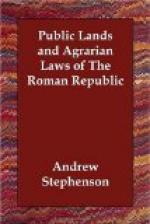[Footnote 24: Niebuhr, I.]
[Footnote 25: Momm., I, 126; Ihne, I; Nitzsch, Geschichte der roemischen Republik, 52; Lange, Roemische Geschichte, I, 18.]
[Footnote 26: Dureau de la Malle, Mem. sur les pop. de l’Italie, 500 et seq.]
SEC. 2.—QUIRITARIAN OWNERSHIP.
Citizenship was the first requisite to the right of property in Roman territory. This rule, although invariable and inherent in the Roman state, bent under the influence of international politics or the philosophy of law, yet its severity affords us a notable characteristic of the law of ancient Rome. Cicero and Gaius have preserved to us an important monument of this law in a fragment of the Twelve Tables which proclaims the solemn principle, adversus hostem aeterna auctoritas esto.[1] Hostis in the old Latin language was synonymous with stranger, perigrinus[2] This Roman name was moreover applied to a person who had forfeited the protection of the law by reason of a criminal condemnation, and who was therefore designated peregrinus.[3]
Auctoritas also had in old Latin a different signification from what it has in later Latin. It expressed the idea of the right to claim and defend in equity. It was very nearly equivalent to the right of property.[4] The sense of the Roman law was, then, that the peregrinus could not bar or proceed against a Roman, a disposition somewhat similar to the old law of England.[5] And as it was necessary to be a citizen in order to acquire by the civil and solemn means which dominated the law of property in Rome, it followed that the peregrini were excluded from all right to property in land by these laws. This exclusive legislation for a long time governed Europe and did not disappear even from the Code Napoleon of 1819.[6]
We have a forcible example of the severity of the old Roman law in this regard in the text of Gaius,—Aut enim ex jure quiritium unusquisque dominus erat, aut non intelligebatur dominus.[7]
Dominium was therefore inseparable from Jus Quiritium, the law of the Roman city, the optimum jus civium Romanorum. The peregrinus was excluded from landed property both Roman and private; he could neither inherit nor transmit; claim nor defend in equity. Moreover the name peregrinus was not confined to the stranger proper but was also bestowed upon subjects of Rome[8] who, being deprived of their property and also of political liberty by right of conquest, had not received the right of citizenship which was for a long time confined within very narrow limits. It would thus appear conclusive from the law quoted that the client and plebeian could not at first hold land optimo ex jure quiritium.
Thus the tenure of the patricians was threefold: First, they had full property in the land; second, they had a seigniorial right, jus in re, in the land of their clients and the plebeians whose property belonged to the populus, i.e. the generality of the patricians; in the third place, in their own hands, they held lands which were portions of the domain and which were held by a very precarious tenure called possessio.




